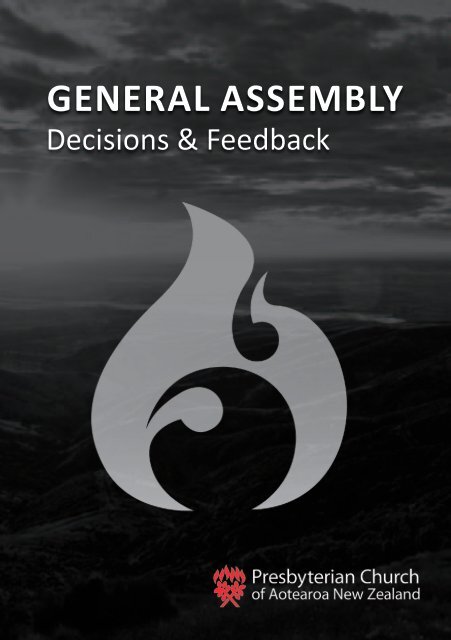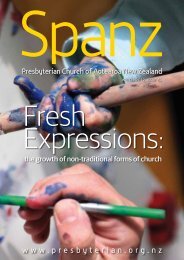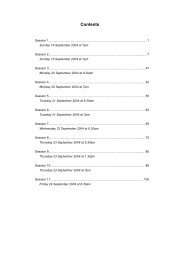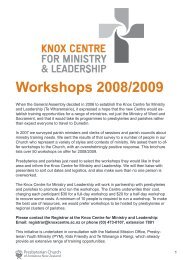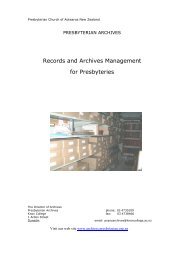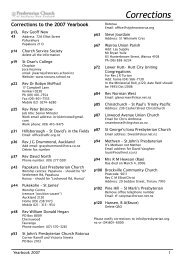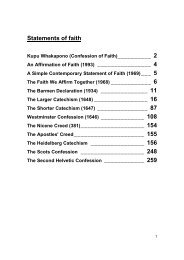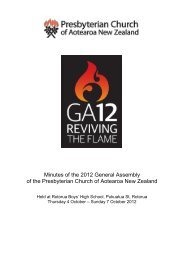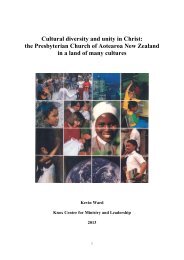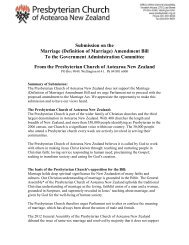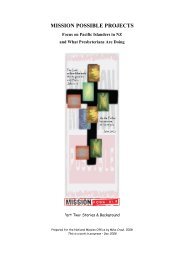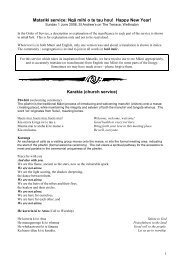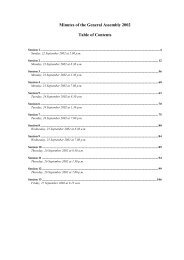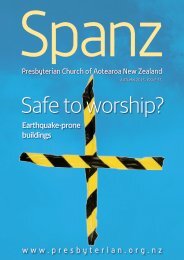here - Presbyterian Church of Aotearoa New Zealand
here - Presbyterian Church of Aotearoa New Zealand
here - Presbyterian Church of Aotearoa New Zealand
Create successful ePaper yourself
Turn your PDF publications into a flip-book with our unique Google optimized e-Paper software.
Dear presbyteries, synods, Te Aka Puaho<br />
and church councils<br />
Please take the time to read the following Assembly decisions, and<br />
read and respond to the proposed legislative changes and discussion<br />
documents. Your feedback is important to the future <strong>of</strong> our <strong>Church</strong>.<br />
For ease <strong>of</strong> use this booklet is divided into three parts:<br />
1. BOOK OF ORDER CHANGES<br />
All presbyteries, UDCs, Te Aka Puaho, Pacific Islands’ Synod and church<br />
councils are asked to vote on a number <strong>of</strong> proposed legislative changes.<br />
The results <strong>of</strong> votes, either in support <strong>of</strong> or against these changes, need to<br />
be returned to the Assembly Office by 1 July 2013.<br />
2. DISCUSSION DOCUMENTS<br />
T<strong>here</strong> are three discussion documents requiring feedback and responses.<br />
Please take the time to read these documents and provide a response to the<br />
questions, and send your feedback to the Assembly Office by 1 July 2013.<br />
3. ASSEMBLY DECISIONS<br />
T<strong>here</strong> are a number <strong>of</strong> decisions that the 2012 General Assembly made<br />
which may have importance in the context <strong>of</strong> your own decision-making.<br />
These decisions are for your information and do not require any response to<br />
the Assembly Office.
PART 1<br />
CHANGES TO THE BOOK OF ORDER<br />
The 2012 General Assembly accepted a number <strong>of</strong> changes to the Book <strong>of</strong><br />
Order, but some <strong>of</strong> these changes are subject to special legislative procedure.<br />
This means that they cannot be finally adopted until presbyteries/UDCs<br />
(including Te Aka Puaho and the Pacific Islands Synod) and church councils<br />
have considered and voted on them, and the 2014 General Assembly has<br />
considered the proposals for a second time.<br />
The eight proposals to be considered are below. The rationale for each is<br />
presented. If a majority <strong>of</strong> presbyteries and church councils disapprove <strong>of</strong><br />
a proposal, the next General Assembly cannot accept it. If a majority <strong>of</strong><br />
presbyteries approve a proposal, the next General Assembly will decide<br />
whether or not to finally adopt it. The details <strong>of</strong> the special legislative<br />
procedure are set out in Book <strong>of</strong> Order 14.9.<br />
You are asked to approve or disapprove <strong>of</strong> each <strong>of</strong> these proposals, and to<br />
complete and return the attached voting form by 1 July 2013. Amendments<br />
cannot be made to these proposals.<br />
Please note that all <strong>of</strong> the 2012 proposals which are subject to the special<br />
legislation procedure were adopted as interim provisions, and are thus in use<br />
in the meantime.<br />
Proposal 1: Delete Chapter 10.1(6). Confusion has arisen from the<br />
different meanings <strong>of</strong> “congregation” and “charge” in the Book <strong>of</strong> Order. The<br />
simplest way to resolve this issue is to drop the word “charge” from the Book<br />
<strong>of</strong> Order. 10.1(6) is the only such clause which requires referral under the<br />
special legislative procedure. Chapter 5.1(1) has been amended to make it<br />
clear that a congregation may unite for worship, life and mission in more than<br />
one place <strong>of</strong> worship.
Proposal 2: (a) Amend Chapter 2.2 and 10.6(4) by deleting the words “Guide<br />
to Procedures in Cooperative Ventures” and replacing them with the words<br />
“Procedures for Cooperative Ventures”.<br />
(b) Amend Chapter 8.4(1) by adding “(v) to undertake the duties <strong>of</strong><br />
Coordinating Partner or Participating Partner for Cooperative Ventures<br />
according to the Procedures for Cooperative Ventures.”<br />
These changes are a technicality, to make the Book <strong>of</strong> Order consistent with<br />
the wording <strong>of</strong> the revised Cooperating Ventures procedures, which the 2012<br />
General Assembly adopted. (Similar amendments made to other clauses are<br />
not subject to the special legislative procedure.)<br />
Proposal 3: Amend Chapter 14.15(1)(c) by deleting the words “Association <strong>of</strong><br />
<strong>Presbyterian</strong> Women” and replacing with the words, “<strong>Presbyterian</strong> Women<br />
<strong>Aotearoa</strong> <strong>New</strong> <strong>Zealand</strong>.”<br />
This change is also a technicality to make the Book <strong>of</strong> Order consistent with<br />
the name change adopted by <strong>Presbyterian</strong> Women. (Similar amendments<br />
made to other clauses are not subject to the special legislative procedure.)<br />
Proposal 4: Amend Chapter 7.11(1) by adding at the end <strong>of</strong> the sentence the<br />
words, “save that up to 40 per cent <strong>of</strong> the members <strong>of</strong> a parish council need<br />
not be elders who have been ordained in accordance with Chapter 9.”<br />
This change clarifies that not all members <strong>of</strong> a parish council need be<br />
ordained elders, and imposes a limit on non-ordained membership. This<br />
formalises a situation which has <strong>of</strong>ten arisen when sessions and boards <strong>of</strong><br />
managers (whose members have frequently not been ordained elders) have<br />
combined into a parish council.<br />
Proposal 5: Amend Chapter 14.23 by adding: “7A. If the Council <strong>of</strong><br />
Assembly decides that it is impractical or undesirable to delay any action or<br />
implementation <strong>of</strong> the matter, subsection (7) does not apply.”<br />
This applies to appeals from a presbytery to the General Assembly. Subsection<br />
7 states that an appeal stops all further action on the matter until the appeal<br />
has been resolved, normally by a judicial commission. Currently, Chapter<br />
14.22 provides that the Council <strong>of</strong> Assembly can override the prima facie<br />
provision in the case <strong>of</strong> references from a presbytery to General Assembly,<br />
which are dealt with in the same way as appeals, and the extension <strong>of</strong> this<br />
power to appeals is considered highly desirable.
Proposal 6: (a) Amend Chapter 8.4(2) by adding a second sentence: “For the<br />
avoidance <strong>of</strong> any doubt, a person may not appeal from a church council to<br />
a presbytery on an employment matter which is governed by the relevant<br />
Parliamentary legislation.”<br />
(b) Amend Chapter 14.23(1) by adding a fourth sentence: “For the avoidance<br />
<strong>of</strong> any doubt, this section does not apply to an employment matter which is<br />
governed by the relevant Parliamentary legislation.”<br />
This reflects the undesirability <strong>of</strong> permitting appeals in employment disputes<br />
to a presbytery or the General Assembly i.e. employment issues should be<br />
dealt with under employment law.<br />
Proposal 7: Amend Chapter 16.2(7) by deleting the words “<strong>Church</strong> courts”<br />
and replacing them with the words “church councils”.<br />
The term “court” is defined in Book <strong>of</strong> Order Appendix 1 as either a presbytery<br />
or the General Assembly. A church council is not a court. Chapter 16.2,<br />
however, places the responsibility for the day-to-day management <strong>of</strong> church<br />
property in the hands <strong>of</strong> members <strong>of</strong> the “<strong>Church</strong> court”. Given the definition<br />
<strong>of</strong> “court”, the easiest way to overcome this interpretation issue is to make it<br />
clear that it is the members <strong>of</strong> the church council who have responsibility for<br />
the day-to-day management <strong>of</strong> the property under its care.<br />
Proposal 8: Amend the following clauses by adding the words, “and Pacific<br />
Islands Synod” after the words “Te Aka Puaho”:<br />
(a) Chapter 8.17<br />
(b) Chapter 10.5<br />
(c) Chapter 14.9<br />
(d) Chapter 14.26<br />
(e) Chapter 14.31<br />
(f) Chapter 15.4<br />
General Assembly’s decision to grant the Pacific Islands Synod the status <strong>of</strong> a<br />
presbytery means that a number <strong>of</strong> clauses which refer to presbyteries and Te<br />
Aka Puaho need to be expanded to include the Pacific Islands Synod.
VOTING PAPER<br />
For proposals accepted by 2012 General Assembly and referred to<br />
presbyteries and church councils under the special legislative procedure.<br />
NAME OF VOTING BODY<br />
(presbytery, UDC, Te Aka Puaho, Pacific Islands Synod, church council)<br />
Please tick one box for each proposal.<br />
ITEM SUBJECT APPROVE DISAPPROVE<br />
1 deletion <strong>of</strong> word “charge”<br />
2 Co-operative Ventures name change<br />
3 <strong>Presbyterian</strong> Women name change<br />
4 parish council membership<br />
5 appeals provisions<br />
6 employment appeals<br />
7 church council property responsibilities<br />
8 Pacific Islands Synod presbytery status<br />
I confirm that this is a true and correct record <strong>of</strong> the decisions made by<br />
the above body on the proposals referred by the 2012 General Assembly<br />
under the special legislative procedure.<br />
The duly constituted meeting at which this voting was conducted was held on:<br />
signed: _____________________________________________<br />
name (please print)____________________________________<br />
position held__________________________________________<br />
Please return this form by 1 July 2013 to:<br />
Assembly Executive Secretary<br />
<strong>Presbyterian</strong> <strong>Church</strong> <strong>of</strong> <strong>Aotearoa</strong> <strong>New</strong> <strong>Zealand</strong><br />
P O Box 9049<br />
Wellington 6141
PART 2<br />
DISCUSSION DOCUMENTS<br />
Please take the time to consider these matters and send your<br />
responses to the Assembly Office by 1 July 2013.<br />
Discussion 1: The Moderator as missional leader <strong>of</strong> the<br />
<strong>Church</strong><br />
A discussion and consultation document for presbyteries, the Pacific Island<br />
Synod, Te Aka Puaho and church councils.<br />
INTRODUCTION:<br />
In response to decisions at the 2012 General Assembly, the Council <strong>of</strong><br />
Assembly has developed this consultation document inviting the <strong>Church</strong> to<br />
consider proposals relating to both the role <strong>of</strong> the <strong>Church</strong>’s Moderator, and<br />
how that role could be developed to support the <strong>Church</strong>’s mission.<br />
Two key issues are:<br />
1. The role <strong>of</strong> the Moderator in the <strong>Presbyterian</strong> <strong>Church</strong> <strong>of</strong> <strong>Aotearoa</strong><br />
<strong>New</strong> <strong>Zealand</strong>.<br />
2. The way the <strong>Church</strong> discerns and provides national missional leadership<br />
in a time <strong>of</strong> change.<br />
BACKGROUND:<br />
Sometime back in the history <strong>of</strong> our <strong>Church</strong>, perhaps the only duty <strong>of</strong> the<br />
Moderator was to preside over the General Assembly. Over time, the role<br />
developed to include such things as visiting presbyteries and congregations,<br />
being the spokesperson for the <strong>Church</strong>, and using their specific skills and<br />
gifts to provide leadership and support for the <strong>Church</strong>’s mission.<br />
The role and function <strong>of</strong> the Moderator needs to also be considered within<br />
the specific context <strong>of</strong> the <strong>Presbyterian</strong> <strong>Church</strong>’s polity and ethos. The<br />
<strong>Presbyterian</strong> <strong>Church</strong> is a hierarchical church, but not in terms <strong>of</strong> individuals<br />
holding increasingly significant authority, but <strong>of</strong> councils or courts <strong>of</strong> elders
– usually identified as session, presbytery, and finally General Assembly.<br />
<strong>Presbyterian</strong>s believe God’s will is best discerned when the <strong>Church</strong> in all<br />
its diversity comes together as a whole. In order to discern God’s will on<br />
important issues and indeed in deciding these issues, the whole <strong>Church</strong><br />
is needed.<br />
T<strong>here</strong> is then a tension, at times, within our <strong>Church</strong>, between the values we<br />
place on individual leadership and the importance <strong>of</strong> the decisions we make<br />
as leaders together discerning God’s purposes and will.<br />
The proposals in this document attempt to hold these two critical issues<br />
for our <strong>Church</strong> in a positive and creative balance: on one hand, the need<br />
to provide the kind <strong>of</strong> national leadership that is responsive, focused,<br />
empowering and visionary, and on the other, to affirm the <strong>Presbyterian</strong><br />
and conciliar way we discern God’s will and make decisions and rules.<br />
Information from the General Assembly:<br />
In adopting the Strategic Directions paper in 2011, the Council <strong>of</strong> Assembly<br />
agreed to the following:<br />
“That the Council <strong>of</strong> Assembly establish a work group to review the role and<br />
function <strong>of</strong> the Moderator (including but not limited to extending the term <strong>of</strong> the<br />
Moderator, and including the role <strong>of</strong> Convenor <strong>of</strong> Council <strong>of</strong> Assembly in the role<br />
<strong>of</strong> the Moderator).”<br />
In consultation with present and past Moderators, the work group’s report<br />
affirmed:<br />
• The primacy <strong>of</strong> mission in the life <strong>of</strong> the <strong>Church</strong><br />
• The locus <strong>of</strong> mission is the local church<br />
• The mission priority expressed at a regional level through the reform <strong>of</strong><br />
presbyteries<br />
• The Council’s Strategic Direction paper endorsing the Moderator as the<br />
missional leader <strong>of</strong> the <strong>Church</strong>, seeing this as the Moderator’s primary role<br />
• The call in the Strategic Directions paper for alignment throughout the whole<br />
<strong>Church</strong> for effective mission to happen<br />
• The need for missional leadership at EVERY level (and particularly at the<br />
highest elected level) to reflect this mission priority.<br />
In terms <strong>of</strong> missional leadership and responsibility, the work group’s report<br />
noted the following:<br />
1. T<strong>here</strong> seems to be a vacuum within the <strong>Church</strong>’s thinking, structures<br />
and policy around the area <strong>of</strong> mission. T<strong>here</strong> appears to be no<br />
individual, nor any clearly identifiable group, with responsibility for<br />
this as part <strong>of</strong> their agenda.
2. The current job description <strong>of</strong> the Assembly Executive Secretary does<br />
not describe him/her as the mission leader; although it is very clear<br />
the Assembly Executive Secretary must have a passion for mission<br />
and work within the strategic directions <strong>of</strong> the Council <strong>of</strong> Assembly<br />
to explore this aspect <strong>of</strong> our life together.<br />
3. The Moderator <strong>of</strong> the General Assembly, Assembly Executive<br />
Secretary and the Council <strong>of</strong> Assembly have distinctive and<br />
complementary roles in implementing the mission <strong>of</strong> the <strong>Church</strong>.<br />
4. In order to enhance the missional leadership <strong>of</strong> the <strong>Church</strong> in a way<br />
that is consistent with our <strong>Presbyterian</strong> conciliar government, and in<br />
line with the Strategic Directions paper adopted by the Council <strong>of</strong><br />
Assembly, a moderatorial commission should be formed.<br />
5. The membership <strong>of</strong> this moderatorial commission would comprise<br />
the immediate past Moderator, the Moderator Designate, and four<br />
other trusted leaders. Among other roles, the moderatorial<br />
commission would act as a search committee for the next Moderator,<br />
in a process similar to that which a Ministry Settlement Board uses to<br />
discern whom God is calling to a congregation with a<br />
ministerial vacancy.<br />
A term <strong>of</strong> four years, full-time, for the Moderator seems appropriate in<br />
order to ensure the implementation <strong>of</strong> mission priorities, sufficient time to<br />
gain a thorough working knowledge <strong>of</strong> the <strong>Church</strong> and its role in society and<br />
(with the moderatorial commission) to research the trends in the diverse<br />
multicultural, multi-ethnic, bicultural and cross-cultural context in which the<br />
<strong>Church</strong> operates. This implies that a Moderator may moderate more than one<br />
Assembly in his/her term.<br />
This will ensure continuity and enhance the opportunity for the Moderator<br />
to engage with the larger presbyteries, as well as engage face-to-face with<br />
the wider.<br />
A four-year full-time role would open the possibility <strong>of</strong> a call to a wider range<br />
<strong>of</strong> candidates. It is also acknowledged that this will most likely lead to the<br />
breaking <strong>of</strong> the pastoral tie between a minister and parish or chaplaincy.<br />
Similarly, a lay Moderator would be expected to take up a full-time position<br />
in the <strong>Church</strong>.
Summary:<br />
In the context <strong>of</strong> the rapidly changing and increasingly diverse<br />
environment that the <strong>Church</strong> finds itself, the Council <strong>of</strong> Assembly<br />
believes it important to provide a more cohesive and integrated<br />
engagement with mission at all levels <strong>of</strong> the life <strong>of</strong> our <strong>Church</strong>. It<br />
proposes to do this through the development <strong>of</strong> the role <strong>of</strong> the<br />
Moderator as a full-time committed function, supported by a small<br />
commission whose work will focus on discerning and engaging with the<br />
missional challenges <strong>of</strong> the <strong>Church</strong>. The Council acknowledges that the<br />
development <strong>of</strong> the moderatorial role, along with the establishment<br />
<strong>of</strong> a commission that supports this function, does represent some<br />
challenges in terms <strong>of</strong> our <strong>Presbyterian</strong> and conciliar way <strong>of</strong> being.<br />
However, with a commitment to ensure a high level <strong>of</strong> communication<br />
with the <strong>Church</strong> along with a clear accountability to the Assembly,<br />
t<strong>here</strong> would be sufficient checks to ensure that this new structure<br />
would fulfil an important role in the leadership <strong>of</strong> our <strong>Church</strong>.<br />
The Council welcomes any feedback from this document as it works on<br />
formulating specific proposals to be discussed at the 2014 Assembly.<br />
Discussion Questions:<br />
1. Do you support:<br />
(a) a proposal that the Moderator be identified as the missional leader <strong>of</strong> the<br />
<strong>Church</strong> and<br />
(b)that the role becomes four years and full-time?<br />
2. Do you support:<br />
(a) the establishment by the Assembly <strong>of</strong> a moderatorial commission. This<br />
would have the functions <strong>of</strong> supporting the Moderator and his/ her work<br />
as missional leader?<br />
(b) a moderatorial commission also serving as the search committee for<br />
the next Moderator?
DISCUSSION 2:<br />
MODERATOR OF TE AKA PUAHO<br />
Moderator Of Te Aka Puaho Discussion Paper II<br />
During the 2012 General Assembly discussion, relating to the role<br />
<strong>of</strong> Moderator, Te Aka Puaho, the Māori Synod, asked that the<br />
<strong>Church</strong> consider the following matter:<br />
‘That General Assembly, acknowledging the sacred<br />
covenant <strong>of</strong> the Treaty <strong>of</strong> Waitangi (Te Kawenata Tapu o Te<br />
Tiriti o Waitangi), and the commitment <strong>of</strong> our <strong>Church</strong> to a<br />
bicultural partnership, asks the <strong>Church</strong> to consider the<br />
position <strong>of</strong> Moderator <strong>of</strong> Te Aka Puaho as being <strong>of</strong> equal<br />
status as the Moderator <strong>of</strong> General Assembly.’<br />
BACKGROUND:<br />
This request by Te Aka Puaho does not supercede the position <strong>of</strong> Moderator<br />
<strong>of</strong> General Assembly but is to be seen as a support role to the Moderator <strong>of</strong><br />
General Assembly during the term <strong>of</strong> the Office <strong>of</strong> the Moderator <strong>of</strong> General<br />
Assembly.<br />
The role <strong>of</strong> Moderator <strong>of</strong> Te Aka Puaho continues to grow and change with each<br />
generation. The Moderator is based in Whakatane but has a national and international<br />
role. Te Aka Puaho has pastorates throughout <strong>Aotearoa</strong> <strong>New</strong> <strong>Zealand</strong>.<br />
The role is continuing to grow into a cross-cultural role with the Moderator<br />
<strong>of</strong>ten being invited to visit parishes and other <strong>Church</strong> organisations throughout<br />
PCANZ to share the vision and mission <strong>of</strong> Te Aka Puaho. This cross-culturalism<br />
in action has a high priority as it <strong>of</strong>fers an opportunity to share and interpret<br />
the mission <strong>of</strong> Te Aka Puaho to the entire <strong>Church</strong>. The role is becoming an<br />
educational and ambassadorial role which now also includes international duties.<br />
These not only include hosting church visits from international groups on
learning and cultural exchanges but also require reciprocal visits to international<br />
conferences and events. Te Aka Puaho is also expanding into Australia<br />
working in partnership with the Uniting <strong>Church</strong> <strong>of</strong> Australia to Māori living in<br />
Australia.<br />
The request <strong>of</strong> Te Aka Puaho is based upon sound biblical principles <strong>of</strong><br />
partnership in working together for the unity <strong>of</strong> the Body <strong>of</strong> Christ.<br />
PRESENT SITUATION:<br />
The current situation <strong>of</strong> the Moderator <strong>of</strong> Te Aka Puaho is that the role is currently<br />
unfunded and if the Moderator is a minister he/she is tied to a pastorate.<br />
It is the wish <strong>of</strong> Te Aka Puaho to have the position funded by PCANZ enabling<br />
the Moderator to be released from other duties to fulfil his/her moderatorial<br />
duties and to be more fully involved in the life <strong>of</strong> PCANZ. The Moderator is the<br />
acknowledged mission leader <strong>of</strong> Te Aka Puaho and has also become the recognised<br />
team leader <strong>of</strong> Amorangi ministers within Te Aka Puaho. The current<br />
Moderator is the Director <strong>of</strong> Te Wananga a rangi a non-NZQA or TEC registered<br />
Māori School <strong>of</strong> Theology and the Director <strong>of</strong> Amorangi Ministry Training. It the<br />
desire <strong>of</strong> Te Aka Puaho to see the role <strong>of</strong> Moderator separated from the other<br />
two roles to enable the Moderator to concentrate upon the role <strong>of</strong> Moderator<br />
as mission leader <strong>of</strong> Te Aka Puaho, cross-cultural educator to PCANZ and<br />
international host.<br />
QUESTIONS AND FEEDBACK:<br />
1. The <strong>Presbyterian</strong> <strong>Church</strong> <strong>of</strong> <strong>Aotearoa</strong> new <strong>Zealand</strong> recognises, within<br />
the context <strong>of</strong> the Treaty <strong>of</strong> Waitangi, a bicultural partnership<br />
between Te Aka Puaho and its other <strong>Church</strong> Courts. What do you<br />
think are the principles that should guide the provision <strong>of</strong> <strong>Church</strong><br />
resources in terms <strong>of</strong> upholding the values <strong>of</strong> this partnership?<br />
2. How can the <strong>Church</strong> affirm and recognise the status <strong>of</strong> the<br />
Moderator <strong>of</strong> Te Aka Puaho in relation to its commitment to this<br />
bicultural partnership?<br />
3. Please make any comments you would likeon the suggestion from<br />
Te Aka Puaho that the Moderator <strong>of</strong> Te Aka Puaho be funded directly<br />
from national PCANZ resources as one <strong>of</strong> the ways the <strong>Church</strong> can<br />
recognise this partnership?
DISCUSSION 3:<br />
MISSION AND PROPERTY<br />
How can we make best use <strong>of</strong> the resources entrusted to us for the service<br />
<strong>of</strong> God’s <strong>Church</strong> and its mission?<br />
The most important things are matters <strong>of</strong> faith – who and what we believe<br />
God is calling us to be and do. We cannot make up rules and regulations to<br />
control and govern our mission. However, we are a <strong>Church</strong> together, and as<br />
an organisation we need to both affirm our hope and faith, and we do need<br />
to agree on the regulations which guide the way we work.<br />
This discussion document asks you to reflect on the relationships between<br />
property and mission, and to discuss whether this proposal will help to meet<br />
the considerable challenges we face as we work to provide the resources to<br />
support our work ahead.<br />
COMPLIANCE AND VISION<br />
We want to be a dynamic, outward facing <strong>Church</strong> whose growth bears<br />
witness to our commitment to sharing in God’s mission for our world. We<br />
recognize that our future cannot be based on telling people what to do or<br />
enforcing compliance to regulations. Scripture expresses powerful visions and<br />
stories <strong>of</strong> costly discipleship, radical hospitality and the transforming power <strong>of</strong><br />
the Holy Spirit. None <strong>of</strong> these things can be contained within, or prescribed,<br />
by any structure. However, we still need to set these stories - and the call God<br />
makes on our lives and our life together - alongside the way we organise and<br />
govern ourselves as the <strong>Presbyterian</strong> <strong>Church</strong>, and use our resources.<br />
In this proposal, our hope is that our wealth will be celebrated as a blessing,<br />
and the guidelines we put in place to share our resources will ensure God’s<br />
Good <strong>New</strong>s will be brought to our communities and the world as a source <strong>of</strong><br />
joy and unity.<br />
We face the challenge <strong>of</strong> making decisions about buildings and property<br />
which are no longer fit for the purpose they were designed. We have, over<br />
the years, collectively accumulated very significant wealth in property and<br />
money, which, if shared, and amalgamated, could be the source <strong>of</strong> huge<br />
blessing for others, and support the shaping <strong>of</strong> a <strong>Church</strong> whose mission has<br />
real significance for present and future generations.
This proposal expresses an appeal for a vision larger than any single<br />
congregation’s and asks for trust in people and processes that can make a real<br />
difference for the future life and growth <strong>of</strong> our <strong>Church</strong>.<br />
WHAT IS HAPPENING NOW?<br />
Presbyteries and congregations around <strong>New</strong> <strong>Zealand</strong> are exploring creative<br />
and exciting ways <strong>of</strong> being the <strong>Church</strong> in mission for, and within, our diverse<br />
communities. Almost all our growth comes from congregations who place a<br />
priority on mission to their wider communities, and who see their buildings<br />
as serving the primary focus <strong>of</strong> Christian service and outreach.<br />
However, we recognise the escalating costs <strong>of</strong> building ownership along with<br />
the fact that many <strong>of</strong> our buildings were built to serve a very different social<br />
and missional context than the ones with which we are challenged today.<br />
We do not want to support a scenario which sees the spiralling costs <strong>of</strong><br />
building ownership provide ever increasing limits on the resources available<br />
for mission.<br />
We also acknowledge, with both gratitude and concern, that through the<br />
generosity and hard work <strong>of</strong> our forebears, and as a result <strong>of</strong> increasing<br />
property values, we now own collectively assets worth hundreds <strong>of</strong> millions<br />
<strong>of</strong> dollars. These assets serve a <strong>Church</strong> greatly diminished in membership<br />
from the time when many <strong>of</strong> our buildings were constructed. In fact, while<br />
we now have more congregations and quite probably more buildings than<br />
we owned in 1960, our membership has decreased by more than 60 per cent<br />
since that time.<br />
As a <strong>Church</strong> we also wrestle with our own inclination to use resources to<br />
serve our local needs, to resist change, and to prop up structures and ways<br />
<strong>of</strong> doing things that are not working well to engage the Gospel message with<br />
those who are absent from our midst.<br />
We acknowledge that t<strong>here</strong> are biblical mandates that:<br />
• Warn us <strong>of</strong> the dangers <strong>of</strong> accumulation <strong>of</strong> wealth<br />
• Affirm that what we have is not ours but is part <strong>of</strong> God’s<br />
providence and blessing<br />
• Call us into a discipleship that challenges us to commit all we<br />
have and are for God’s purposes
Two further issues <strong>of</strong> justice and fairness which we also seek to recognise in<br />
this proposal are:<br />
1. Our commitment to Te Tangata Whenua through Te Aka Puaho.<br />
Our <strong>Church</strong> has affirmed on numerous occasions the seriousness<br />
with which we take this partnership and the need to recognise<br />
and celebrate the special relationship between Maori and Pakeha<br />
in meaningful, tangible ways.<br />
2. Our recognition as a <strong>Church</strong> that a very small number <strong>of</strong> our<br />
buildings embody our taonga in their aesthetics, values, stories<br />
and traditions. They have special significance to our history, place<br />
and identity as a <strong>Church</strong> in this land and, for this reason, the cost<br />
<strong>of</strong> their care should be shared, at least in part, by us all.<br />
In recent years the Assembly has recognised some <strong>of</strong> the consequences <strong>of</strong> the<br />
changing context <strong>of</strong> our mission, and the need to support new and creative<br />
responses to the challenges we face. It has affirmed models <strong>of</strong> “healthy<br />
congregations” and identified areas <strong>of</strong> mission focus in “the five faces <strong>of</strong><br />
mission” strategic framework. The Assembly has supported diminished<br />
spending on national operations, and the reform <strong>of</strong> presbyteries, as changes<br />
intended to ensure that the primary use <strong>of</strong> <strong>Church</strong> resources is to support the<br />
mission <strong>of</strong> congregations.<br />
In terms <strong>of</strong> property the General Assembly has made decisions:<br />
• Endorsing the principle that all property transactions serve the<br />
purposes <strong>of</strong> God’s mission.<br />
• Inviting the <strong>Church</strong> Property Trustees to release capital funds for<br />
growth, as well as building projects, and inviting them to ensure<br />
that all property sales and purchases conform to mission guidelines.<br />
• Establishing the PressGo Advisory Group who are charged with<br />
facilitating the sharing <strong>of</strong> <strong>Church</strong> resources for church growth,<br />
and whose work congregations and presbyteries have been encouraged<br />
to support.<br />
The <strong>Church</strong> has already agreed that the purpose <strong>of</strong> the <strong>Church</strong>’s property is<br />
to serve God’s mission.
However, the Assembly agreed to invite presbyteries and congregations<br />
to discuss these proposals:<br />
1. That the <strong>Church</strong> Property trustees establish a Mission<br />
Enterprise Fund.<br />
2. That the <strong>Church</strong> Property Trustees transfer 10% <strong>of</strong> the net<br />
proceeds <strong>of</strong> all congregation and presbytery building and<br />
property sales to the Mission Enterprise Fund.<br />
3. That the balance <strong>of</strong> the sale be available to the congregation<br />
who sold the property for a maximum <strong>of</strong> 24 months, from the<br />
day <strong>of</strong> settlement, within which time the congregation must<br />
develop and receive presbytery approval for plans to allocate or<br />
use the funds for advancing God’s mission. Any funds remaining<br />
at the end <strong>of</strong> 24 months will be released to the Mission<br />
Enterprise Fund.<br />
4. That, in order to build relationships across our <strong>Church</strong>,<br />
strengthen our shared commitment to mission, and to abide by<br />
the spirit <strong>of</strong> the <strong>Church</strong> Property Act, the use <strong>of</strong> funds released<br />
to the Mission Enterprise Fund will be undertaken in consultation<br />
with the congregation or presbytery identified with the<br />
sale <strong>of</strong> the property.<br />
ALLOCATION OF THE MISSION ENTERPRISE FUND:<br />
Te Aka Puaho Taonga Building Fund PressGo<br />
10% 20% 70%<br />
Note that the PressGo allocation is accessible by any congregation or<br />
presbytery including the congregation who sold the asset, and Te Aka<br />
Puaho, for growth projects that comply with PressGo’s mandate.<br />
EXEMPTIONS FOR SHARING:<br />
1. A manse is sold in order to purchase another manse. However, any<br />
pr<strong>of</strong>it from the transactions shall be subject to the Shared Proceeds<br />
calculation.<br />
2. A single congregation is replacing one worship centre with another.
Administration <strong>of</strong> the Process:<br />
The <strong>Church</strong> Property Trustees will, in consultation with the Synod <strong>of</strong> Otago<br />
and Southland, administer the disbursement <strong>of</strong> funds.<br />
Applications for support by the taonga fund will be made by the<br />
congregations or groups responsible for the taonga building after receiving<br />
endorsements by their respective presbytery.<br />
Determination <strong>of</strong> taonga status will be at the sole discretion <strong>of</strong> a committee<br />
established by the Council <strong>of</strong> Assembly for that purpose. However the<br />
number <strong>of</strong> buildings will not normally exceed 10 and will include our <strong>Church</strong>’s<br />
national marae, Te Maungarongo.<br />
The General Assembly may determine from time to time the ratios and<br />
allocations identified in this proposal.<br />
QUESTIONS:<br />
1. Do you support the view that the purpose <strong>of</strong> all church property<br />
is to serve God’s mission?<br />
2. Do you support a collective response to the challenges <strong>of</strong> sharing<br />
and rationalising our resources for supporting this mission?<br />
3. Are you supportive <strong>of</strong> these proposals?<br />
4. What changes or additions would you like to make?<br />
5. If you were to write a list <strong>of</strong> 10 <strong>Church</strong> buildings, the responsibility<br />
<strong>of</strong> whose preservation we should share because <strong>of</strong> their historical<br />
and cultural values to our <strong>Church</strong>, which buildings would<br />
you include?
PART 3<br />
ASSEMBLY DECISIONS<br />
The Assembly has directed that the following decisions be shared with all<br />
<strong>Church</strong> bodies to inform their own policy and decision making.<br />
CLIMATE CHANGE AND PACIFIC NATIONS<br />
That the <strong>Church</strong> advocates for climate change refugees by strongly encouraging<br />
the <strong>Aotearoa</strong> <strong>New</strong> <strong>Zealand</strong> government to establish relocation strategies<br />
with the governments <strong>of</strong> those Pacific island nations whose natural island<br />
habitats are no longer tenable due to the effects <strong>of</strong> climate change.<br />
MARRIAGE<br />
That General Assembly declares that it upholds the historic Christian understanding<br />
<strong>of</strong> marriage as the loving, faithful union <strong>of</strong> a man and a woman (reflecting<br />
the complementarity <strong>of</strong> male and a woman created in God’s image),<br />
which is grounded in nature and in Scripture, is supremely revealed in Jesus’<br />
teaching about marriage, and is given by God for the well-being <strong>of</strong> human society<br />
“and this be communicated to our government”.<br />
That, in faithfulness to the historic Christian understanding <strong>of</strong> marriage as<br />
grounded in the Bible and the teachings <strong>of</strong> Jesus and in consistency with previous<br />
resolutions <strong>of</strong> the General Assembly relating to marriage (1991and 2004),<br />
General Assembly resolves that the <strong>Presbyterian</strong> <strong>Church</strong> <strong>of</strong> <strong>Aotearoa</strong> <strong>New</strong><br />
<strong>Zealand</strong> does not support same-sex ‘marriage’ and urges Parliament not to<br />
proceed with the proposed amendment to the Marriage Act “and through the<br />
select committee process as the majority view <strong>of</strong> the<br />
General Assembly”.<br />
That General Assembly urges Parliament not to alter or confuse the<br />
meaning <strong>of</strong> marriage, which has always been about the union <strong>of</strong> male and<br />
female, and is <strong>of</strong> deep spiritual significance for <strong>New</strong> <strong>Zealand</strong>ers <strong>of</strong> many<br />
faiths and cultures; and the General Assembly also asserts that with regard to<br />
equality – the Civil Union Act (2004) already provides for clear societal recognition<br />
and legal protection <strong>of</strong> same-sex relationships.
CHRISTIAN WORLD SERVICE<br />
That Assembly endorses the work and ministry <strong>of</strong> Christian World Service<br />
and recommends it to its parishes.<br />
INTER CHURCH BIOETHICS COMMITTEE<br />
That ministers and elders encourage people to access the Inter<br />
<strong>Church</strong> Bioethics Council website and raise bioethical issues <strong>of</strong> concern<br />
with the Council.<br />
INTER-TERTIARY CHAPLAINCY COUNCIL (ITCC)<br />
That Assembly affirms the importance <strong>of</strong> on-going support for tertiary<br />
chaplaincy in <strong>Aotearoa</strong> <strong>New</strong> <strong>Zealand</strong> through involvement in the Inter-Tertiary<br />
Chaplaincy Council (ITCC) and the regional ecumenical tertiary chaplaincy<br />
trust boards.<br />
LIVING WAGE<br />
That the <strong>Presbyterian</strong> <strong>Church</strong> <strong>of</strong> <strong>Aotearoa</strong> <strong>New</strong> <strong>Zealand</strong> affirms and supports<br />
the Living Wage <strong>Aotearoa</strong> <strong>New</strong> <strong>Zealand</strong> Campaign.<br />
That the <strong>Presbyterian</strong> <strong>Church</strong> <strong>of</strong> <strong>Aotearoa</strong> <strong>New</strong> <strong>Zealand</strong> encourages<br />
congregations, church schools, and social service agencies with a<br />
connection to the <strong>Presbyterian</strong> <strong>Church</strong> <strong>of</strong> <strong>Aotearoa</strong> <strong>New</strong> <strong>Zealand</strong> to examine<br />
their employee remuneration packages and work towards payment <strong>of</strong> a<br />
living wage.<br />
CARING FOR CHILDREN<br />
That the <strong>Church</strong> commits itself in Christ to do justice, to love compassionately,<br />
and to walk with humility before God in our care for children by:<br />
a) Training church leaders to identify need.<br />
b) Actively supporting those who work with and for children.<br />
c) Advocating for vulnerable children as a <strong>Church</strong> and with<br />
other <strong>Church</strong> Leaders.<br />
d) Acting w<strong>here</strong>ver we can to care for vulnerable children<br />
e) Raising awareness in our congregations and communities <strong>of</strong><br />
the plight and needs <strong>of</strong> children in our midst.<br />
f) Supporting and strengthening families.
www.presbyterian.org.nz


